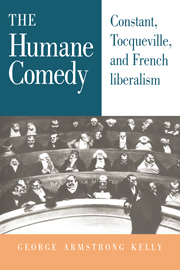5 - LAMARTINE, LIBERALISM'S FALLEN ANGEL
Published online by Cambridge University Press: 31 March 2010
Summary
UT POESIS POLITIGA?
It was not so much the cravenness or stupidity of the liberals as their wishful historical forgetfulness that confused them when the Orléans dynasty, believed solid, melted into air. Their plight was, of course, aggravated by complacency and social blindness. And they scarcely honored their oath to Louis-Philippe, at the point of crisis or in its wake. They had gained effective power in France at “one of those blessed moments in history when everything is simple” (i.e. 1830). Now all was bewilderment. “M. Thiers and M. Barrot,” Tocqueville comments mordantly, “were almost demented.” But he, too, was very sorely perplexed.
One of the vehicles of this dementia was the powerful rhetoric of Alphonse de Lamartine, who should have known how to remain a gentleman. M. de Lamartine, who, by liberal standards of taste and propriety, should not have let a revolution be made was, nevertheless, himself a liberal by most of our available criteria. He was also a poet; Plato had warned against poets.
Lamartine not only helped to make (or, better, channel) the February 1848 revolution; he was widely accused of causing it as well, notably by publishing his Histoire des Girondins, “whose crude colors,” in Tocqueville's uncharitable language, “besmeared every imagination.” Petty noble of the Old Regime, member (since 1830) of the Academie Franchise, deputy (since 1834) of the Chamber, former diplomat under Charles X and friend of Polignac, arrant Legitimist and heterodox Catholic, precocious libertine, poet and orator of renown, Lamartine was, in the words of Charles de Remusat, “un homme dangereux.”
- Type
- Chapter
- Information
- The Humane ComedyConstant, Tocqueville, and French Liberalism, pp. 181 - 220Publisher: Cambridge University PressPrint publication year: 1992



